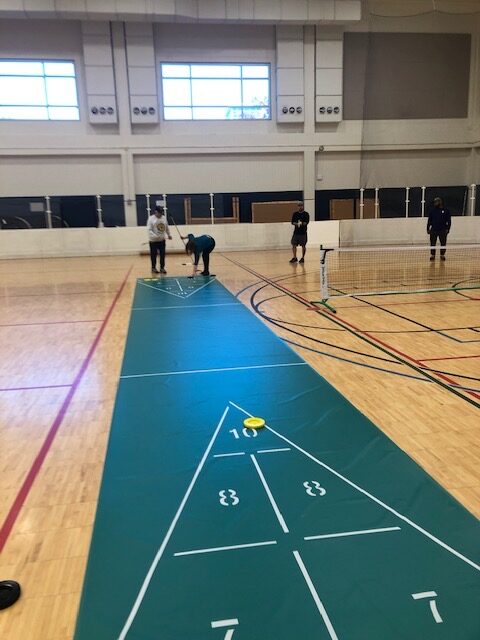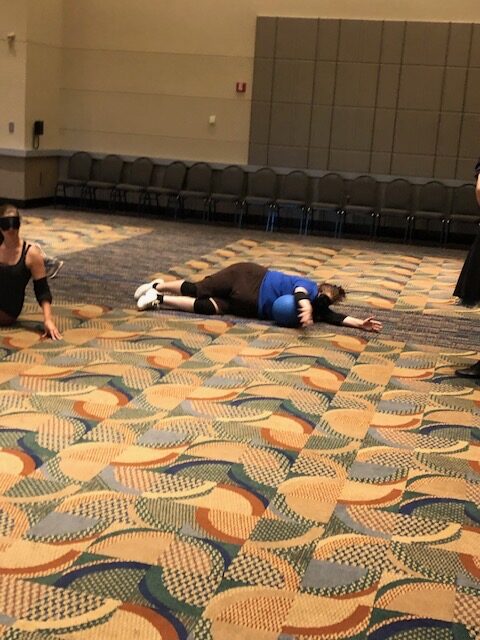Strive4You’s purpose is to provide professional opportunities, disability awareness training and adaptive activities.

Like many children with a visual impairment, Christy Jones-Ray was subjected to the usual skepticism associated with vision loss. Her initial “diagnosis” was lying to get attention.
This went on until she was about 15. Doctors then believed she had developed macular degeneration, an age-related condition that blurs a person’s central vision. Further testing revealed she was too young for this condition. Doctors ultimately diagnosed her with Stargardt, a rare genetic eye disease that causes fatty material to build up on the macula.
“I went through public school just trying to survive,” said Jones-Ray, a native of Nashville whose vision is currently limited to peripheral shapes and occasional shadows.
It wasn’t until she turned 30 that Jones-Ray discovered adaptive sports existed for blind and visually impaired people like herself. She met her current husband, Ricky Jones, while volunteering at the Tennessee Association of Blind Athletes (TNABA), which folded in 2019. Ricky, who was born visually impaired, encouraged Christy to give adaptive sports a try.
Once she got a taste of sports like goalball and running, Jones-Ray was hooked.
“My mom jokes around that I went from smoking two packs of cigarettes a day to running full marathons. It definitely changed things.”
After TNABA ceased operations, Christy and Ricky began looking for an outlet to promote sports and recreation activities for the blind and visually impaired. That’s when they decided to establish Strive4You, and the organization officially gained nonprofit status in January 2020. They saw a great need for various activities and safety education through the contacts they had made through TNABA. Strive4You’s purpose is to provide professional opportunities, disability awareness training and adaptive activities. The name Strive is an acronym based on six core principles: strength, training, recreation, inspiration, vitality and empowerment. Each principle addresses many of the qualities necessary in bringing the blind and sighted populations together for an inclusive experience.
“When our board was first formed, (we asked) what name was important to them that sticks out to the blind and visually impaired community that will drive home what this is for.”
Strive’s two key programs are Adaptive Recreation Increasing Success and Empowerment (ARISE) and Safety Education Empowering Defense (SEED). ARISE provides fun and innovative opportunities for educating the community and encouraging the blind and visually impaired to engage in physical activities. SEED offers adapted self-defense instruction that promotes safety and security.
The idea is to overcome the challenges of including people with low vision in recreational activities, competitive sports and physical education classes alongside sighted peers.
Jones-Ray believes creating a more level playing field is beneficial for both participants and education professionals.
“We offer professional development workshops. It teaches professionals how to adapt sports. We have adaptive sports days, where we’ll go into places and basically play games all day. They pick out a few adaptive sports they want us to come out and demonstrate.”
Strive currently offers a goalball program, with practices each Saturday featuring up to 15 participants. Jones-Ray hopes to put a couple of teams together to compete in a United States Association of Blind Athletes (USABA) tournament in May. The organization is also working on offering archery and cycling programs in the future.
According to a 2022 Washington Post article, only 4 percent of elementary schools, 7 percent of middle schools and 2 percent of high schools offer daily physical education classes. Opportunities for blind and visually impaired students to take part in PE are even fewer. Strive is trying to reverse this trend through its PE with a Twist initiative. Jones-Ray and her staff visit public schools, take over a physical education class and demonstrate an adaptive sport.
“We show them either beep kickball or goalball, and they get to ask questions, whether it has to do with the sport, blindness, whatever.”
It was through this initiative that Jones-Ray contacted the Foreseeable Future Foundation. After talking with CEO Griffin Pinkow, she received a grant to be used for purchasing equipment and covering transportation expenses for visiting the schools.
Transportation is a big deal when you can’t drive yourself. (The grant) is helping pay people to do the work. We usually try to supply lunch. We’ve done some where we’ll be there for the whole week.
Veterans are also important to Strive’s mission and its services. Through a partnership with the National Veterans Sports and Special Events program and Veterans Affairs Medical Centers, the nonprofit gives blind and visually impaired veterans the chance to participate in adaptive sports and recreation. Known as Veterans Healthy Tomorrow, this initiative promotes physical and mental health through Adaptive Sports Days, tournaments and camps.
We got a Veterans Administration adaptive sports grant in 2020, 2021 and 2022. We have a lot of them that like to play in the goalball tournament we do in May. We also were doing bowling and beep kickball. We travel across the country to go to VA’s and work with their point of contact on hosting these events.
It’s important that the leaders of Strive be able to relate to the everyday struggles faced by the blind and visually impaired. To that end, 75 percent of the organization’s board is made up of people with various disabilities.
“Our board, staff and volunteers lean heavily towards getting those who are with disabilities off the couch doing something they are passionate about. To us, if they have that passion, they’re going to be more willing to participate and be active.”
When it comes to sports and recreation, blind and low vision individuals deserve the same chances as everyone else. It took years before Jones-Ray realized those opportunities existed, and she doesn’t want others to miss out.
“My passion is that they don’t have to go down those same roads we had to, or have the same struggles through public schools without resources like we did.”

For more information on Strive4You and its services, visit their website.
